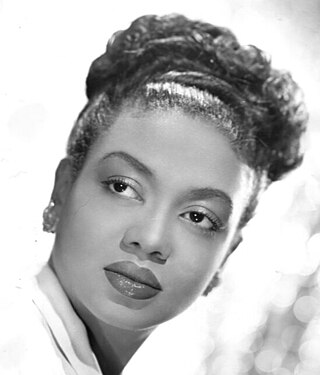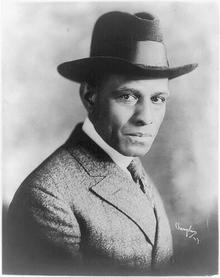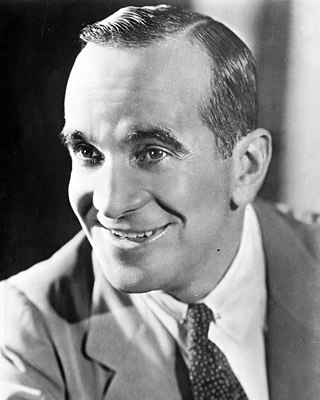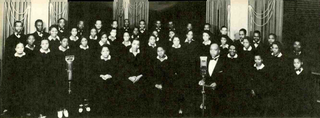The Negro leagues were United States professional baseball leagues comprising teams of African Americans. The term may be used broadly to include professional black teams outside the leagues and it may be used narrowly for the seven relatively successful leagues beginning in 1920 that are sometimes termed "Negro Major Leagues".
Spirituals is a genre of Christian music that is associated with African Americans, which merged varied African cultural influences with the experiences of being held in bondage in slavery, at first during the transatlantic slave trade and for centuries afterwards, through the domestic slave trade. Spirituals encompass the "sing songs", work songs, and plantation songs that evolved into the blues and gospel songs in church. In the nineteenth century, the word "spirituals" referred to all these subcategories of folk songs. While they were often rooted in biblical stories, they also described the extreme hardships endured by African Americans who were enslaved from the 17th century until the 1860s, the emancipation altering mainly the nature of slavery for many. Many new derivative music genres such as the blues emerged from the spirituals songcraft.

The United Service Organizations Inc. (USO) is an American nonprofit-charitable corporation that provides live entertainment, such as comedians, actors and musicians, social facilities, and other programs to members of the United States Armed Forces and their families. Since 1941, it has worked in partnership with the Department of War, and later with the Department of Defense (DoD), relying heavily on private contributions and on funds, goods, and services from various corporate and individual donors. Although it is congressionally chartered, it is not a government agency.

Hazel Dorothy Scott was a Trinidadian jazz and classical pianist and singer. She was an outspoken critic of racial discrimination and segregation. She used her influence to improve the representation of Black Americans in film.

Lena Mary Calhoun Horne was an American singer, actress, dancer, and civil rights activist. Horne's career spanned more than seventy years and covered film, television, and theatre. Horne joined the chorus of the Cotton Club at the age of sixteen and became a nightclub performer before moving on to Hollywood and Broadway.

Etta Moten Barnett was an American actress and contralto vocalist, who was identified with her signature role of "Bess" in Porgy and Bess. She created new roles for African-American women on stage and screen. After her performing career, Barnett was active in Chicago as a major philanthropist and civic activist, raising funds for and supporting cultural, social and church institutions. She also hosted a radio program in Chicago and represented the United States in several official delegations to nations in Africa.

Arthur "Dooley" Wilson was an American actor, singer and musician who is best remembered for his portrayal of Sam in the 1942 film Casablanca. In that romantic drama, he performs its theme song "As Time Goes By".

The Will Mastin Trio was a troupe of dancers and singers formed by Will Mastin, Sammy Davis Sr., and Sammy Davis Jr. The original members were Sammy Davis Sr., Howard M. Colbert Jr., and Will Mastin, although Sammy Davis Jr. would join them on stage when he was a little boy. Howard M. Colbert Jr. was the tap-dance teacher of Sammy Davis Jr., who treated him much as an uncle. Colbert left the Trio in December 1941 to join the United States Army when the United States declared war on Germany during World War II. Sammy Davis Jr. was 16 years old at this time and became part of the main vaudeville act, replacing Colbert.

William Mercer Cook, better known as Will Marion Cook, was an American composer, violinist, and choral director. Cook was a student of Antonín Dvořák. In 1919 he took his New York Syncopated Orchestra to England for a command performance for King George V of the United Kingdom, and tour. Cook is probably best known for his popular songs and landmark Broadway musicals, featuring African-American creators, producers, and casts, such as Clorindy, or The Origin of the Cake Walk (1898) and In Dahomey (1903). The latter toured for four years, including in the United Kingdom and United States.
Ruth Fernández was a Puerto Rican contralto and a member of the Puerto Rican Senate. According to the "Comisiones Nacionales para la Celebración del Quinto Centenario" (National Commission for the Celebration of the Fifth Centennial), she is said to be one of three artists whose contributions have helped unite Latin America. The other two artists named were Libertad Lamarque from Argentina and Pedro Vargas from Mexico.

African-American musical theater includes late 19th- and early 20th-century musical theater productions by African Americans in New York City and Chicago. Actors from troupes such as the Lafayette Players also crossed over into film. The Pekin Theatre in Chicago was a popular and influential venue.

Joshua Daniel White was an American singer, guitarist, songwriter, actor and civil rights activist. He also recorded under the names Pinewood Tom and Tippy Barton in the 1930s.

The American Negro Theatre (ANT) was co-founded on June 5, 1940 by playwright Abram Hill and actor Frederick O'Neal. Determined to build a "people's theatre", they were inspired by the Federal Theatre Project's Negro Unit in Harlem and by W. E. B. Du Bois' "four fundamental principles" of Black drama: that it should be by, about, for, and near African Americans.

Charles Sidney Gilpin was a stage actor of the 1920s. He played in two New York City debuts: the 1919 premier of John Drinkwater's Abraham Lincoln and the lead role of Brutus Jones in the 1920 premiere of Eugene O'Neill's The Emperor Jones. In 1920, he was the first black person to receive The Drama League's annual award as one of ten people who had done the most that year for American theatre.

The Harlem Renaissance was an intellectual and cultural revival of African-American music, dance, art, fashion, literature, theater, politics and scholarship centered in Harlem, Manhattan, New York City, spanning the 1920s and 1930s. At the time, it was known as the "New Negro Movement", named after The New Negro, a 1925 anthology edited by Alain Locke. The movement also included the new African-American cultural expressions across the urban areas in the Northeast and Midwest United States affected by a renewed militancy in the general struggle for civil rights, combined with the Great Migration of African-American workers fleeing the racist conditions of the Jim Crow Deep South, as Harlem was the final destination of the largest number of those who migrated north.

John Diamond, aka Jack or Johnny, was an Irish-American dancer and blackface minstrel performer. Diamond entered show business at age 17 and soon came to the attention of circus promoter P. T. Barnum. In less than a year, Diamond and Barnum had a falling-out, and Diamond left to perform with other blackface performers. Diamond's dance style merged elements of English, Irish, and African dance. For the most part, he performed in blackface and sang popular minstrel tunes or accompanied a singer or instrumentalist. Diamond's movements emphasized lower-body movements and rapid footwork with little movement above the waist.

Clarence Muse was an American actor, screenwriter, director, singer, and composer. He was the first African American to appear in a starring role in a film, 1929's Hearts in Dixie. He acted for 50 years, and appeared in more than 150 films. He was inducted into the Black Filmmakers Hall of Fame in 1973.

Al Jolson was a Lithuanian-born American singer, actor, and vaudevillian.

Aubrey W. Pankey was an American-born baritone and noted Lieder singer in 1930s Germany. In 1956 he permanently emigrated to East Germany under the growing shadow of McCarthyism together with his companion Fania Fénelon. He was the first American to sing in the People's Republic of China in 1956.

The Wings Over Jordan Choir was an African-American a cappella spiritual choir founded and based in Cleveland, Ohio. The choir was part of the weekly religious radio series, Wings Over Jordan, created to showcase the group.
















